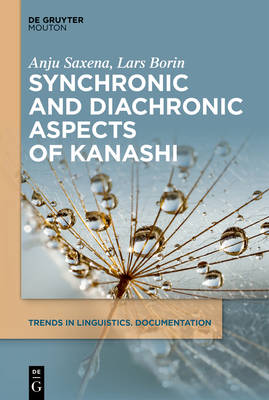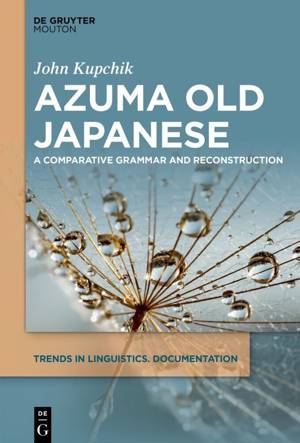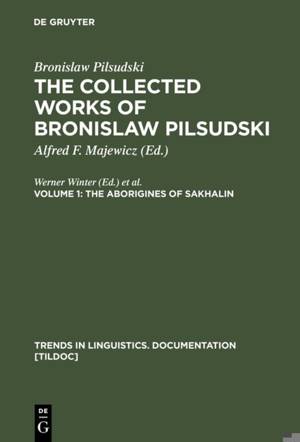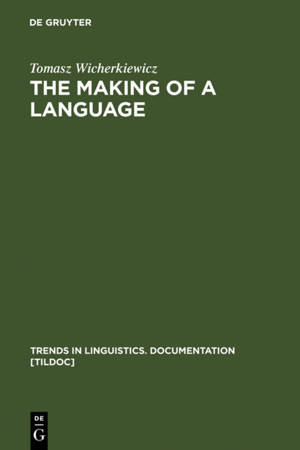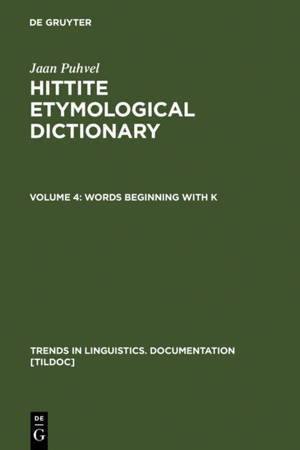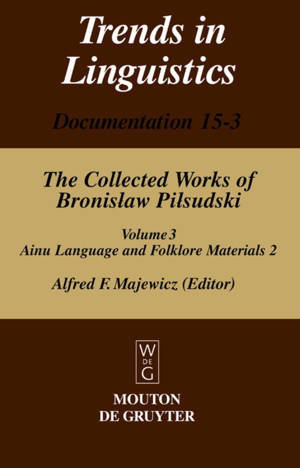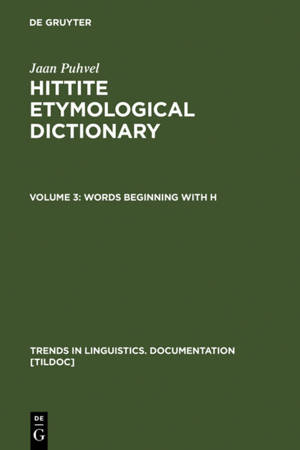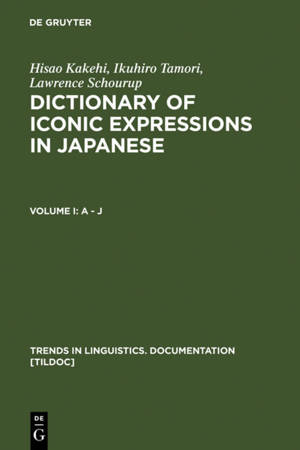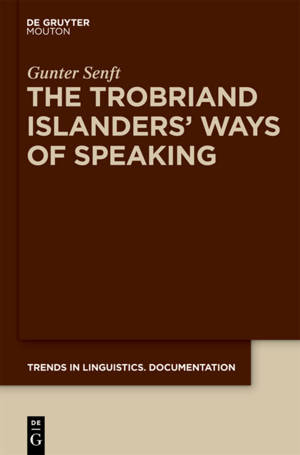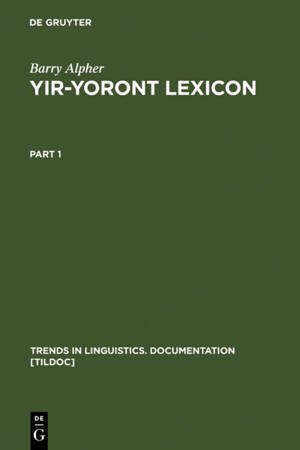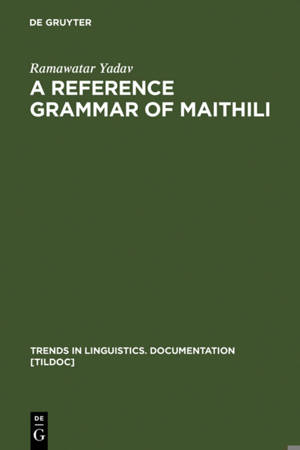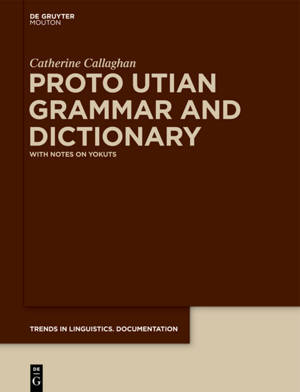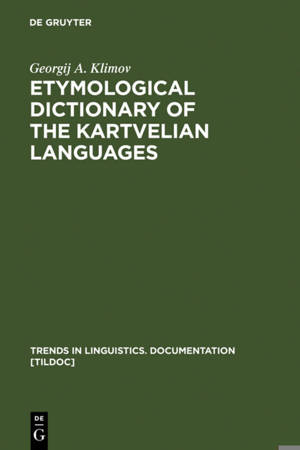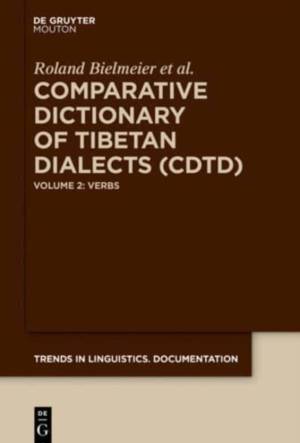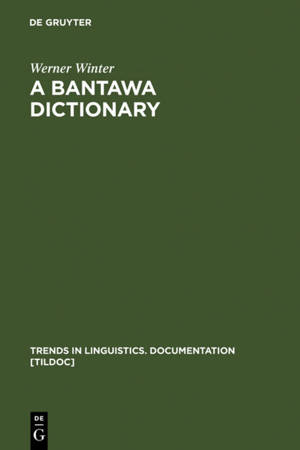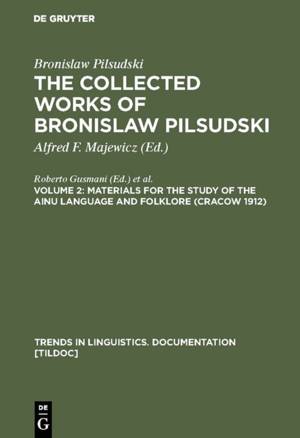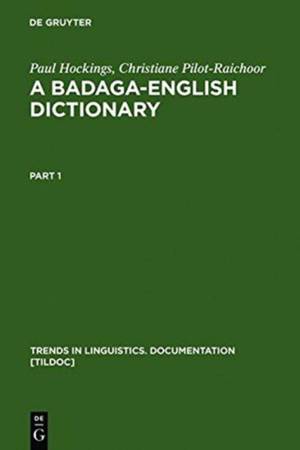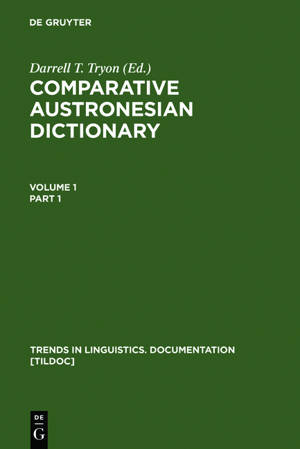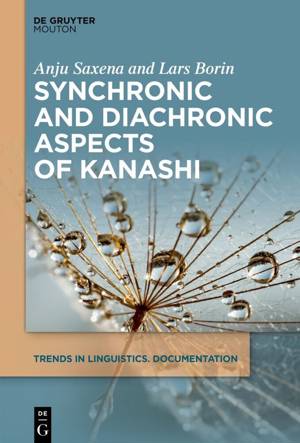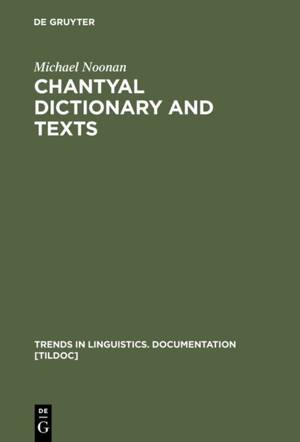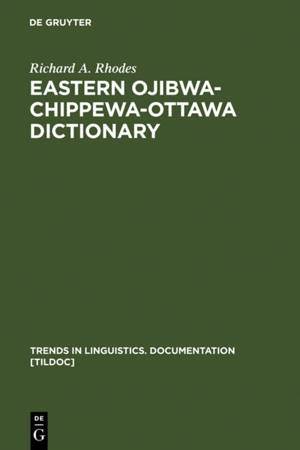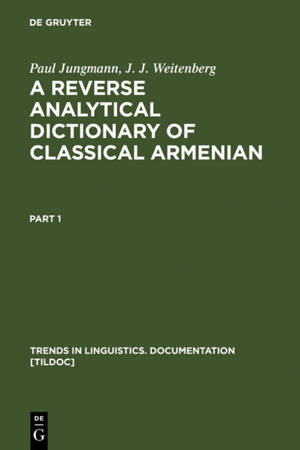
- Retrait gratuit dans votre magasin Club
- 7.000.000 titres dans notre catalogue
- Payer en toute sécurité
- Toujours un magasin près de chez vous
- Retrait gratuit dans votre magasin Club
- 7.000.0000 titres dans notre catalogue
- Payer en toute sécurité
- Toujours un magasin près de chez vous
Résultats pour "Trends in Linguistics. Documentation [Tildoc]"
-
Synchronic and Diachronic Aspects of Kanashi
Anju Saxena, Lars Borin
- Livre relié | Anglais | Trends in Linguistics. Documentation [Tildoc] | n° 38
- Kanashi, a Sino-Tibetan (ST) language belonging to the West Himalayish (WH) subbranch of this language family, is spoken in one single village (Malana... Savoir plus
172,45 €Livraison sous 1 à 4 semaines172,45 €Livraison sous 1 à 4 semaines -
Azuma Old Japanese
John Kupchik
- Livre relié | Anglais | Trends in Linguistics. Documentation [Tildoc] | n° 40
- Azuma Old Japanese is an areal term for the two major dialects of Eastern ('Azuma') Japan during the eighth century: Eastern Old Japanese and Töpo-Sur... Savoir plus
151,95 €Livraison sous 1 à 4 semaines151,95 €Livraison sous 1 à 4 semaines -
The Aborigines of Sakhalin
- Livre relié | Anglais | Trends in Linguistics. Documentation [Tildoc] | n° 15
- Volume 1, The Aborigines of Sakhalin, contains translations into English of the Polish, Russian and Japanese material on, for example, the history, fo... Savoir plus
343,45 €Livraison sous 1 à 4 semaines343,45 €Livraison sous 1 à 4 semaines -
The Making of a Language
Tomasz Wicherkiewicz
- Livre relié | Allemand | Trends in Linguistics. Documentation [Tildoc] | n° 19
- The book presents unique literature in a minority ethnolect - the Germanic dialect of Wilamowice in Southern Poland. The manuscripts, written in the e... Savoir plus
151,95 €Livraison sous 1 à 4 semaines151,95 €Livraison sous 1 à 4 semaines -
Words beginning with K
Jaan Puhvel
- Livre relié | Anglais | Trends in Linguistics. Documentation [Tildoc] | n° 14
- No detailed description available for "Words beginning with K". Savoir plus
211,95 €Livraison sous 1 à 4 semaines211,95 €Livraison sous 1 à 4 semaines -
Materials for the Study of the Ainu Language and Folklore 2
Bronislaw Pilsudski
- Livre relié | Allemand | Trends in Linguistics. Documentation [Tildoc] | n° 15
- Volume 3 is devoted exclusively to B. Pilsudski's Ainu-related materials, for their most part previously unpublished. In addition, it comprises Pilsud... Savoir plus
434,45 €Livraison sous 1 à 4 semaines434,45 €Livraison sous 1 à 4 semaines -
Words Beginning with H
Jaan Puhvel
- Livre relié | Anglais | Trends in Linguistics. Documentation [Tildoc] | n° 5
- No detailed description available for "Words beginning with H". Savoir plus
222,95 €Livraison sous 1 à 4 semaines222,95 €Livraison sous 1 à 4 semaines -
Dictionary of Iconic Expressions in Japanese
Hisao Kakehi, Ikuhiro Tamori, Lawrence Schourup
- Livre relié | Anglais | Trends in Linguistics. Documentation [Tildoc] | n° 12
- The lexicon of Japanese contains a large number of conventional mimetic words which vividly depict sounds, manners of action, states of mind etc. Thes... Savoir plus
241,95 €Livraison sous 1 à 4 semaines241,95 €Livraison sous 1 à 4 semaines -
The Trobriand Islanders' Ways of Speaking
Gunter Senft
- Livre relié | Anglais | Trends in Linguistics. Documentation [Tildoc] | n° 27
- Bronislaw Maliniowski claimed in his monograph Argonauts of the Western Pacific that to approach the goal of ethnographic field-work, requires a "coll... Savoir plus
323,95 €Livraison sous 1 à 4 semaines323,95 €Livraison sous 1 à 4 semaines -
Yir-Yoront Lexicon
Barry Alpher
- Livre relié | Anglais | Trends in Linguistics. Documentation [Tildoc] | n° 6
- Volumes in the Trends in Linguistics. Documentation series focus on the presentation of linguistic data. The series addresses the sustained interest i... Savoir plus
241,95 €Livraison sous 1 à 4 semaines241,95 €Livraison sous 1 à 4 semaines -
Dialects in Contact in Egypt
Saudi Sadiq
- Livre relié | Anglais | Trends in Linguistics. Documentation [Tildoc] | n° 37
- Arab societies have seen considerably large changes over the past 40 years, but sociolinguistic studies conducted on Arabic speech communities have al... Savoir plus
166,95 €Livraison sous 1 à 4 semaines166,95 €Livraison sous 1 à 4 semaines -
Words Beginning with Se, Si, Su
Jaan Puhvel
- Livre relié | Anglais | Trends in Linguistics. Documentation [Tildoc] | n° 36
- The Hittite Etymological Dictionary is a comprehensive compendium of the vocabulary of Hittite, one of the great languages of the Ancient Near East, a... Savoir plus
273,45 €Livraison sous 1 à 4 semaines273,45 €Livraison sous 1 à 4 semaines -
A Reference Grammar of Maithili
Ramawatar Yadav
- Livre relié | Anglais | Trends in Linguistics. Documentation [Tildoc] | n° 11
- No detailed description available for "A Reference Grammar of Maithili". Savoir plus
161,95 €Livraison sous 1 à 4 semaines161,95 €Livraison sous 1 à 4 semaines -
Proto Utian Grammar and Dictionary
Catherine Callaghan
- Livre relié | Anglais | Trends in Linguistics. Documentation [Tildoc] | n° 31
- This book is the result of over 50 years of research, and it represents an intellectual journey. It is maximally accessible by tabulating the data and... Savoir plus
182,45 €Livraison sous 1 à 4 semaines182,45 €Livraison sous 1 à 4 semaines -
Etymological Dictionary of the Kartvelian Languages
Georgij A Klimov
- Livre relié | Anglais | Trends in Linguistics. Documentation [Tildoc] | n° 16
- No detailed description available for "Etymological Dictionary of the Kartvelian Languages". Savoir plus
241,95 €Livraison sous 1 à 4 semaines241,95 €Livraison sous 1 à 4 semaines -
Verbs
Roland Bielmeier, Katrin Häsler, Chungda Haller
- Livre relié | Anglais | Trends in Linguistics. Documentation [Tildoc] | n° 34
- This landmark dictionary serves as a basis for historical-comparative research on Tibetan. Conceptualized empirically and etymologically, it builds on... Savoir plus
384,95 €Livraison sous 1 à 4 semaines384,95 €Livraison sous 1 à 4 semaines -
A Bantawa Dictionary
Werner Winter
- Livre relié | Allemand | Trends in Linguistics. Documentation [Tildoc] | n° 20
- Bantawa, spoken in Eastern Nepal, is the most widely used of the Rai languages, an important subgroup of the Kiranti group of Tibeto-Burman languages.... Savoir plus
161,95 €Livraison sous 1 à 4 semaines161,95 €Livraison sous 1 à 4 semaines -
Materials for the Study of the Ainu Language and Folklore (Cracow 1912)
Bronislaw Pilsudski
- Livre relié | Anglais | Trends in Linguistics. Documentation [Tildoc] | n° 15
- Volume 2, Materials for the Study of Ainu Language and Folklore, contains a reprint of the classic 1912 Cracow edition with an Ainu-English index with... Savoir plus
383,95 €Livraison sous 1 à 4 semaines383,95 €Livraison sous 1 à 4 semaines -
A Badaga-English Dictionary
Paul Hockings, Christiane Pilot-Raichoor
- Livre relié | Anglais | Trends in Linguistics. Documentation [Tildoc] | n° 8
- No detailed description available for "A Badaga-English Dictionary". Savoir plus
262,45 €Livraison sous 1 à 4 semaines262,45 €Livraison sous 1 à 4 semaines -
Comparative Austronesian Dictionary
- Livre relié | Anglais | Trends in Linguistics. Documentation [Tildoc] | n° 10
- No detailed description available for "Comparative Austronesian Dictionary". Savoir plus
788,45 €Livraison sous 1 à 4 semaines788,45 €Livraison sous 1 à 4 semaines -
Synchronic and Diachronic Aspects of Kanashi
Anju Saxena, Lars Borin
- Livre broché | Anglais | Trends in Linguistics. Documentation [Tildoc] | n° 38
- Kanashi, a Sino-Tibetan (ST) language belonging to the West Himalayish (WH) subbranch of this language family, is spoken in one single village (Malana... Savoir plus
20,45 €Livraison sous 1 à 4 semaines20,45 €Livraison sous 1 à 4 semaines -
Chantyal Dictionary and Texts
Michael Noonan
- Livre relié | Anglais | Trends in Linguistics. Documentation [Tildoc] | n° 17
- No detailed description available for "Chantyal Dictionary and Texts". Savoir plus
192,45 €Livraison sous 1 à 4 semaines192,45 €Livraison sous 1 à 4 semaines -
Eastern Ojibwa-Chippewa-Ottawa Dictionary
Richard a Rhodes
- Livre relié | Anglais | Trends in Linguistics. Documentation [Tildoc] | n° 3
- No detailed description available for "Eastern Ojibwa-Chippewa-Ottawa Dictionary". Savoir plus
192,45 €Livraison sous 1 à 4 semaines192,45 €Livraison sous 1 à 4 semaines -
A Reverse Analytical Dictionary of Classical Armenian
Paul Jungmann, J J Weitenberg
- Livre relié | Anglais | Trends in Linguistics. Documentation [Tildoc] | n° 9
- No detailed description available for "A Reverse Analytical Dictionary of Classical Armenian". Savoir plus
292,45 €Livraison sous 1 à 4 semaines292,45 €Livraison sous 1 à 4 semaines





